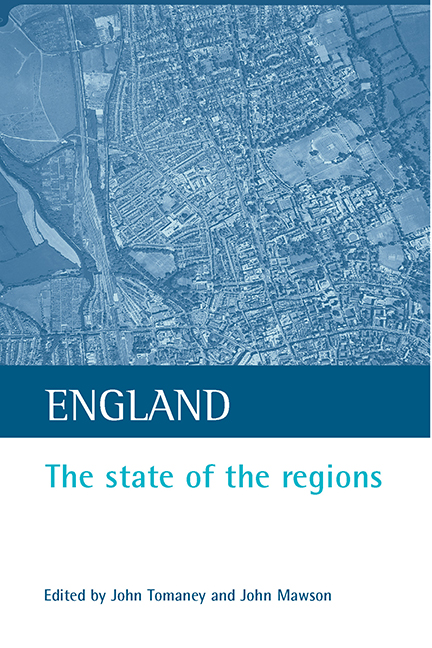Book contents
- Frontmatter
- Contents
- List of tables and figures
- Acknowledgements
- List of contributors
- one Introduction
- two Regional government in England: reviewing the evidence base
- three New Labour and the evolution of regionalism in England
- four Yorkshire (and the Humber)
- five Institutional collaboration in the West Midlands region
- six England's North West
- seven The South West
- eight Regionalism in the East of England
- nine The South East region?
- ten Regionalism in North East England
- eleven Regional strategy development in the East Midlands
- twelve The problem of regional governance
- thirteen Elected regional government: the issues
- fourteen Barnett plus needs: the regional spending challenge in Britain
- fifteen Conclusion: prospects for regionalism
- Index
- Also available from The Policy Press
three - New Labour and the evolution of regionalism in England
Published online by Cambridge University Press: 20 January 2022
- Frontmatter
- Contents
- List of tables and figures
- Acknowledgements
- List of contributors
- one Introduction
- two Regional government in England: reviewing the evidence base
- three New Labour and the evolution of regionalism in England
- four Yorkshire (and the Humber)
- five Institutional collaboration in the West Midlands region
- six England's North West
- seven The South West
- eight Regionalism in the East of England
- nine The South East region?
- ten Regionalism in North East England
- eleven Regional strategy development in the East Midlands
- twelve The problem of regional governance
- thirteen Elected regional government: the issues
- fourteen Barnett plus needs: the regional spending challenge in Britain
- fifteen Conclusion: prospects for regionalism
- Index
- Also available from The Policy Press
Summary
Introduction
In New Labour's first term its action in the regional field was restricted to the establishment of Regional Development Agencies (RDAs) in 1999 and the promotion of voluntary Regional Chambers. However, New Labour did not deliver on the promise, contained in its 1997 Manifesto, to introduce directly elected Regional Assemblies, where there was demonstrable demand (Tomaney, 2000). The period before the General Election of 2001 saw the government act to strengthen the main regional institutions within England. These included additional resources, and the promise of increased financial flexibility, for RDAs and new central government resources for Regional Chambers. New Labour’s deepening engagement with the issue culminated in the commitment on the part of the government to publish a White Paper on English regional government. However, the first Queen's Speech after the election failed to mention the English regions. Moreover, in the aftermath of the election, significant changes in Whitehall departmental responsibilities occurred which had implications for the governance of the English regions. New Labour’s engagement with the English regions continued to reveal an ambivalence about devolution in general and English regionalism in particular.
This chapter outlines the evolution of the new thinking emerging within the government as far as the English regions are concerned, and reports on the development of RDAs, Regional Chambers and the various civic campaigns for devolution that have sprung up in parts of England. The chapter also examines the ways in which the concerns of the English regions have been addressed in Westminster and Whitehall. Although the political space for regionalism may have expanded within England, its shape and progress remain uneven and hotly contested. The chapter concludes by assessing the issues that confronted the government as far as the English regions are concerned.
The regional debate
The evolution of the regional debate was punctuated by a series of interventions by senior Labour figures in the period after July 2000. These interventions followed a call by the party's National Policy Forum for the government to bring forward a White Paper on regional government (Tomaney, 2000). A series of ministerial statements also prepared the way for new resources and responsibilities for RDAs and Regional Chambers.
- Type
- Chapter
- Information
- EnglandThe State of the Regions, pp. 25 - 44Publisher: Bristol University PressPrint publication year: 2002

